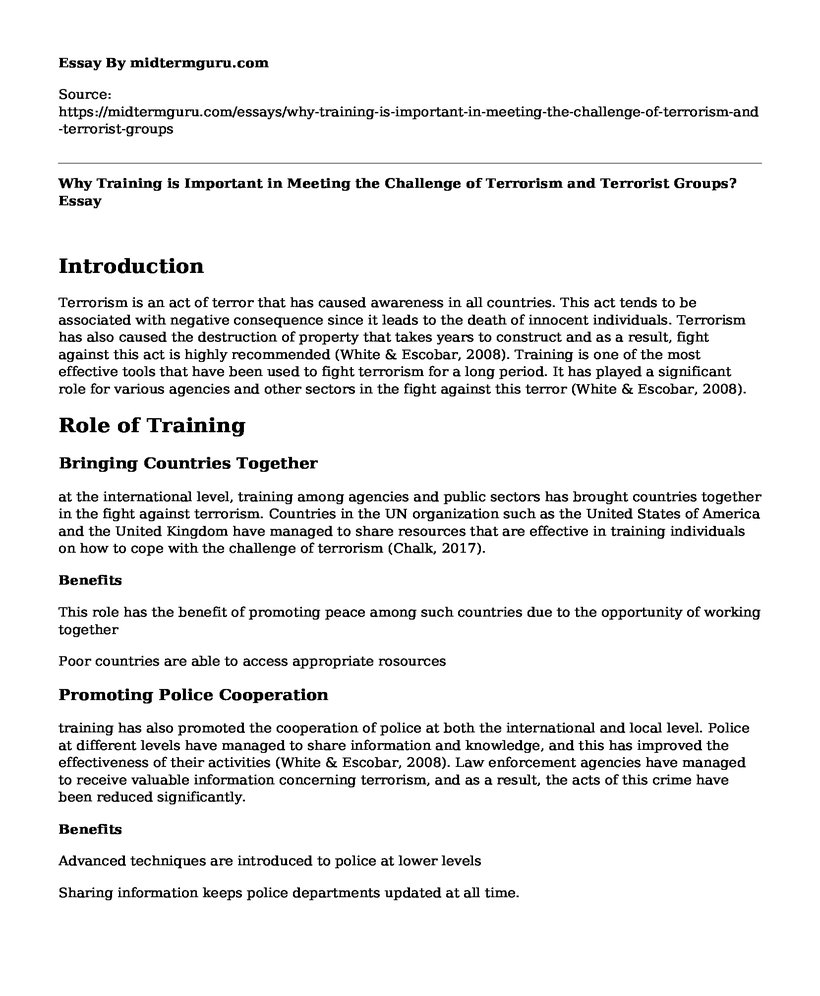Introduction
Terrorism is an act of terror that has caused awareness in all countries. This act tends to be associated with negative consequence since it leads to the death of innocent individuals. Terrorism has also caused the destruction of property that takes years to construct and as a result, fight against this act is highly recommended (White & Escobar, 2008). Training is one of the most effective tools that have been used to fight terrorism for a long period. It has played a significant role for various agencies and other sectors in the fight against this terror (White & Escobar, 2008).
Role of Training
Bringing Countries Together
at the international level, training among agencies and public sectors has brought countries together in the fight against terrorism. Countries in the UN organization such as the United States of America and the United Kingdom have managed to share resources that are effective in training individuals on how to cope with the challenge of terrorism (Chalk, 2017).
Benefits
This role has the benefit of promoting peace among such countries due to the opportunity of working together
Poor countries are able to access appropriate rosources
Promoting Police Cooperation
training has also promoted the cooperation of police at both the international and local level. Police at different levels have managed to share information and knowledge, and this has improved the effectiveness of their activities (White & Escobar, 2008). Law enforcement agencies have managed to receive valuable information concerning terrorism, and as a result, the acts of this crime have been reduced significantly.
Benefits
Advanced techniques are introduced to police at lower levels
Sharing information keeps police departments updated at all time.
Introduction of Effective Practices
training of agencies and public sectors allow police to share the practices they use in the fight against terrorism. Sharing of information concerning such practices allows them to come up with the best strategies that are considered as the most effective in this fight. INTERPOL training has been identified as one of the most effective tools that continue to be adopted by police departments of several countries (Kaplan, 2017).
Benefits
One of the benefits of the introduction of effective practices is that police academies have grown stronger.
Unique services are now available to the academies of various police departments, and this has improved their efforts in the fight against terrorism (Kaplan, 2017).
Training Allows Local and State Agencies to Determine How Well They Are Prepared
when it comes to countering terrorism, preparation is an essential tool (Kaplan, 2017). Training of agencies and private and public sectors is a crucial way of determining whether local and state agencies are prepared in the fight against terrorism. Information such as the response rate of these agencies can be determined and improved in the process. After the attack on the World Trade Center in the United States of America in 2011, it was determined that the response rate of both local and state agencies had to be improved since it was rated at 56 percent during this period (Kaplan, 2017). Improvement of response rate is essential in the fight against terrorism.
Benefits
Response rate of agencies can be improved.
Awarenesscan be increased among local and state agencies.
Learning how to Stabilize Liberated Areas
training is an act that can help agencies to stabilize areas that are threatened with the acts of terrorism (Chalk, 2017). Minimizing the activities of terrorists in such areas can allow nations to combat this act and promote peace. In some countries, terrorists tend to focus their actions on specific areas which have less security. Both local and state agencies can be offered unique training, which is aimed at the stabilization of these regions (Chalk, 2017). This role has been useful in countries such as Iraq and France, and it has promoted reconciliation of regions that have been affected by terrorism for an extended period.
Benefits
Affected areas can be identified and more effort can be foused on these locations
Reconciliation of affected regions is obtained.
References
Chalk, P. (2017). The Response to Terrorism as a Threat to Liberal Democracy 1. In War on Terrorism (pp. 83-98). Routledge.
Kaplan, A. (2017). The counter-terrorism puzzle: A guide for decision makers. Routledge.
White, M. D., & Escobar, G. (2008). Making good cops in the twenty-first century: Emerging issues for effective recruitment, selection, and training of police in the United States and abroad. International Review of Law, Computers & Technology, 22(1-2), 119-134.
Cite this page
Why Training is Important in Meeting the Challenge of Terrorism and Terrorist Groups?. (2022, Sep 13). Retrieved from https://midtermguru.com/essays/why-training-is-important-in-meeting-the-challenge-of-terrorism-and-terrorist-groups
If you are the original author of this essay and no longer wish to have it published on the midtermguru.com website, please click below to request its removal:
- Overcoming Addictions Using Culture: Case of Alkali Lake, BC
- Banker to the Poor by Muhammad Yunus Review
- How Does Ageism and Stereotypes Associated With Ageism Qualify as a Form of Prejudice
- The Epidemic of Teenage Suicide - Paper Example
- Socio-Economic Status Impacts Health of Society & Self - Essay Sample
- Black Activist Movement: A Global Fight for Equality - Essay Sample
- School Health Professional's Duty: Responding to a Student's Self-Harm - Essay Sample







